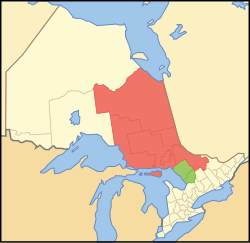Northeastern Ontario: Difference between revisions
No edit summary |
|||
| Line 40: | Line 40: | ||
==Municipalities== |
==Municipalities== |
||
===Cities=== |
===Cities=== |
||
There are six cities in Northeastern Ontario in alphabetical order([[2016 Canadian Census|2016]]), they are.{{citation needed|date=October 2018}} |
There are six cities in Northeastern Ontario in alphabetical order ([[2016 Canadian Census|2016]]), they are.{{citation needed|date=October 2018}} |
||
{| class="wikitable" |
{| class="wikitable" |
||
|- |
|- |
||
Revision as of 13:49, 9 December 2019
Northeastern Ontario Nord-est de l'Ontario (French) | |
|---|---|
Secondary region | |
 ██ Core area ██ Extended area | |
| Coordinates: 48°00′N 81°45′W / 48.000°N 81.750°W | |
| Country | |
| Province | |
| Area | |
• Total | 280,290.16 km2 (108,220.64 sq mi) |
| Population (2016) | |
• Total | 505,625 |
| • Density | 1.96/km2 (5.1/sq mi) |
| Largest city | Greater Sudbury 161,647 (2016) |
Northeastern Ontario is a secondary region of Northern Ontario which lies north of Lake Huron and east of Lake Superior.[1]
Northeastern Ontario consists of the districts of Algoma, Sudbury, Cochrane, Timiskaming, Nipissing and Manitoulin. For some purposes, Parry Sound District and Muskoka District Municipality are treated as part of Northeastern Ontario although they are geographically in Central Ontario. These two divisions are coloured in green on the map.
Northeastern Ontario and Northwestern Ontario may also be grouped together as Northern Ontario. An important difference between the two sub-regions is that Northeastern Ontario has a sizeable Franco-Ontarian population — approximately 25 per cent of the region's population speaks French as a first language, compared with just 3.2 per cent in the northwest.[2] Virtually the entire region, excepting only the Manitoulin District, is designated as a French-language service area under Ontario's French Language Services Act, unlike in the northwest where only a few standalone municipalities are so designated.
Municipalities
Cities
There are six cities in Northeastern Ontario in alphabetical order (2016), they are.[citation needed]
| Name of City | Population | District | Ref. |
|---|---|---|---|
| Elliot Lake | 10,741 | Algoma District | |
| Greater Sudbury | 161,647 | Greater Sudbury | |
| North Bay | 51,533 | Nipissing District | |
| Sault Ste. Marie | 73,368 | Algoma District | |
| Temiskaming Shores | 9,920 | Timiskaming District | |
| Timmins | 41,788 | Cochrane District |
Smaller Towns
Smaller towns in the region include Espanola, Blind River, Chapleau, Cochrane, Englehart, Hearst, Iroquois Falls, Kapuskasing, Kirkland Lake, Mattawa, Moosonee, French River, St. Charles, Markstay-Warren and West Nipissing.
Transportation
The region is served by several branches of the Trans-Canada Highway, including Highway 11, Highway 17, Highway 66 and Highway 69. Several other highways in the region are part of the provincial highway system, but not the national Trans-Canada Highway.
The only freeways in the region are a portion of Highway 17 in the Walden district of Greater Sudbury, and most but not all of Highway 69 between Greater Sudbury and the French River. The remainder of Highway 69 is slated for conversion into a full freeway, and will be redesignated as part of Highway 400 when the construction is complete. The provincial government also has plans on file for the eventual conversion of Highway 17 to freeway from Sault Ste. Marie easterly toward Ottawa, although no timetable for this project has been announced as of 2018 except for the conversion of Highway 17's Southwest and Southeast Bypasses route through Sudbury near the completion of the Highway 69/400 project.
Population
| Population of Northeastern Ontario | |||||||||
|---|---|---|---|---|---|---|---|---|---|
| District | 2016 | ± | 2011 | ± | 2006 | ± | 2001 | ± | 1996 |
| Northeastern Ontario | 505,625 | -0.7% | 508,982 | -0.3% | 510,326 | -3.3% | 512,007 | -5.6% | 542,248 |
| Algoma District | 114,094 | -1.5% | 115,870 | -1.4% | 117,461 | -0.9% | 118,567 | -5.5% | 125,455 |
| Cochrane District | 79,682 | -1.8% | 81,122 | -1.7% | 82,503 † | -3.2% | 85,247 | -8.6% | 93,240 |
| Greater Sudbury (including enclaved Wahnapitae First Nations reserve) |
161,647 | 0.8% | 160,376 | 1.6% | 157,909 | 1.7% | 155,268 | -6.1% | 165,336 |
| Manitoulin District | 13,255 | 1.6% | 13,048 | -0.3% | 13,090 | 3.2% | 12,679 | 7.9% | 11,747 |
| Nipissing District | 83,150 | -1.9% | 84,736 | 0.1% | 84,688 † | 2.1% | 82,910 | -2.3% | 84,832 |
| Sudbury District | 21,546 | 1.7% | 21,196 | -3.0% | 21,392 | -6.6% | 22,894 | -3.9% | 23,831 |
| Timiskaming District | 32,251 | -1.2% | 32,634 | -1.9% | 33,283 | -3.4% | 34,442 | -8.9% | 37,807 |
Provincial parks
References
- ^ Kerry M. Abel, Changing Places: History, Community, and Identity in Northeastern Ontario. McGill-Queen's University Press, 2006. ISBN 9780773530386.
- ^ William Kaplan, Belonging: The Meaning and Future of Canadian Citizenship. McGill-Queen's University Press, 1993. ISBN 9780773509856. p. 142.
